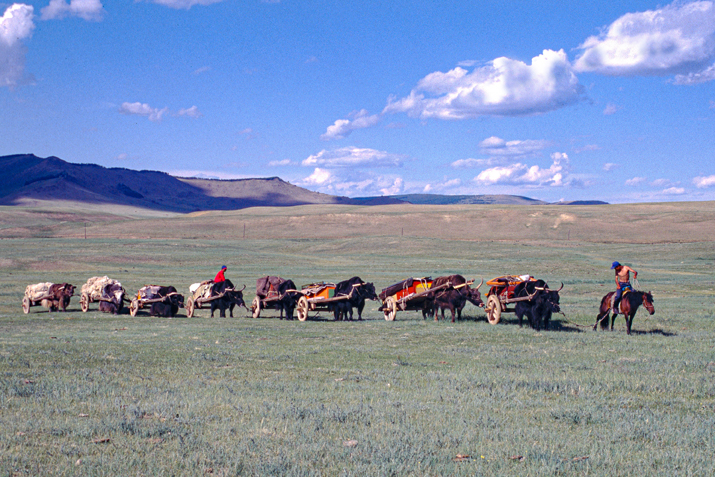
Off to the Tuwa
N 51°33'336'' E 099°15'341''
Day: 153
Sunrise:
09:27
Sunset:
17:17
As the crow flies:
50
Daily kilometers:
70
Total kilometers:
1281
Soil condition:
Ice, snow
Temperature – Day (maximum):
minus 20°C
Temperature – day (minimum):
minus 30°C
Temperature – Night:
minus 30°C
Latitude:
51°33’336”
Longitude:
099°15’341”
Maximum height:
1981 m above sea level

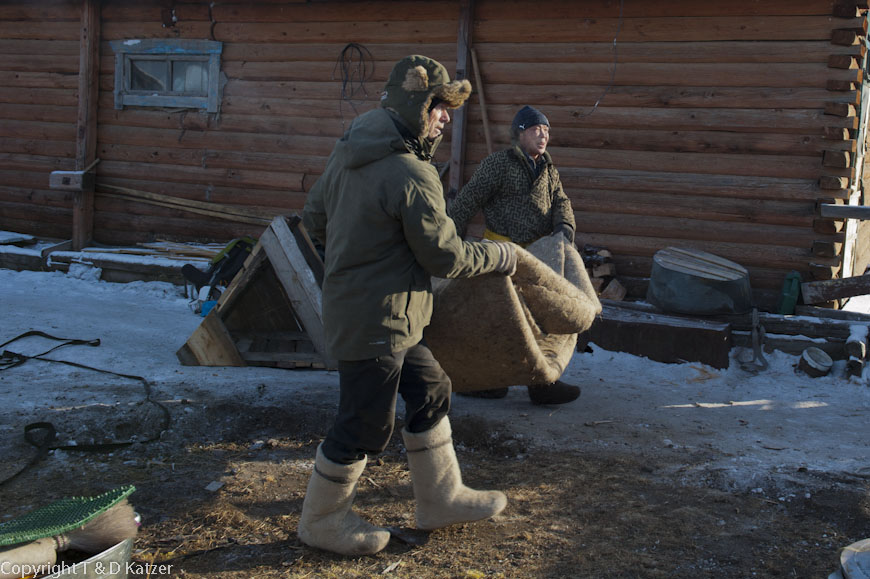

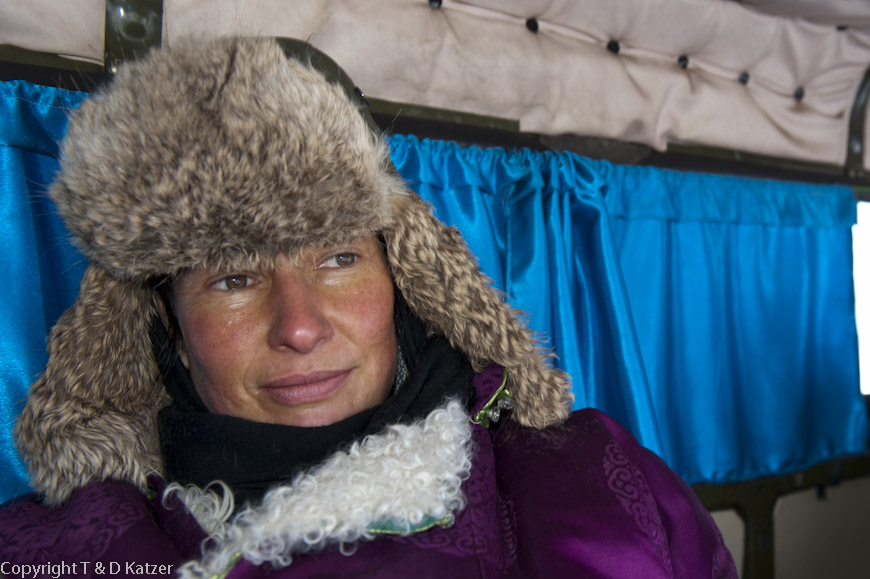
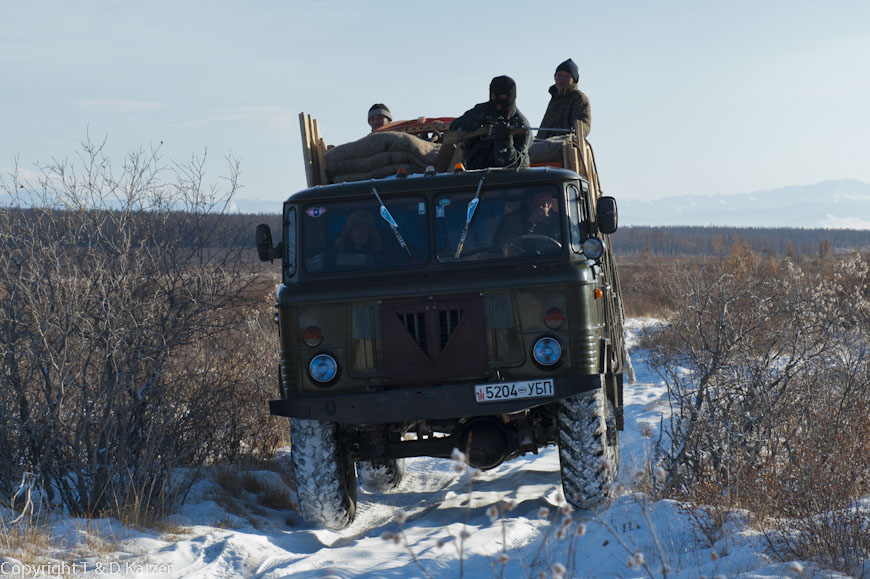
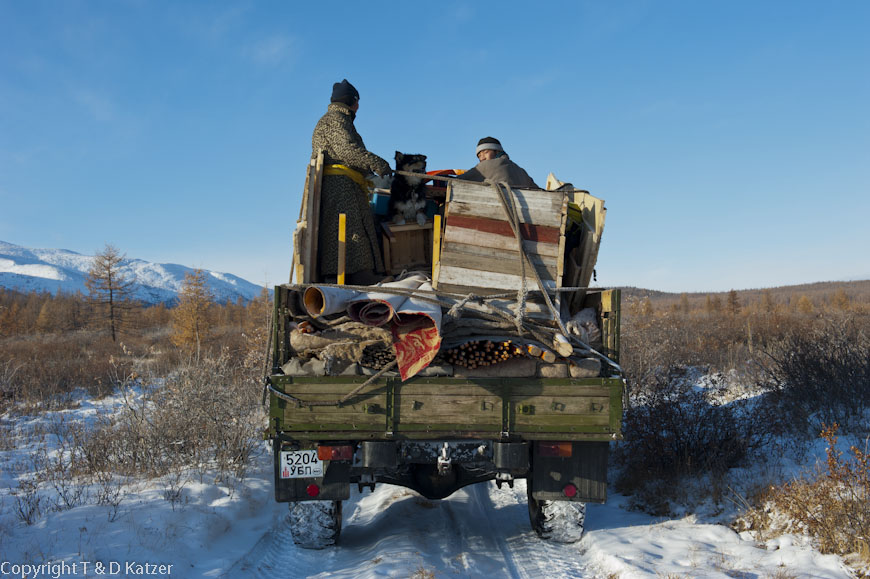

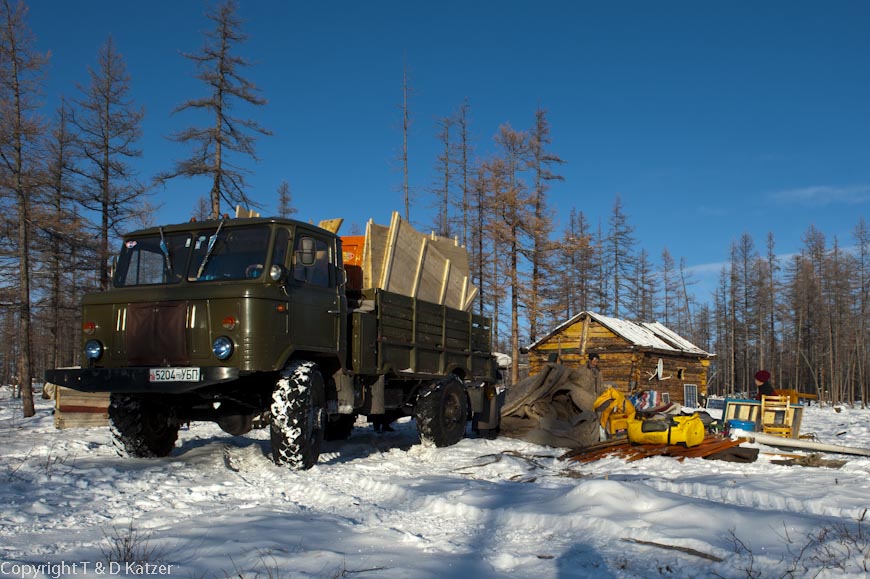
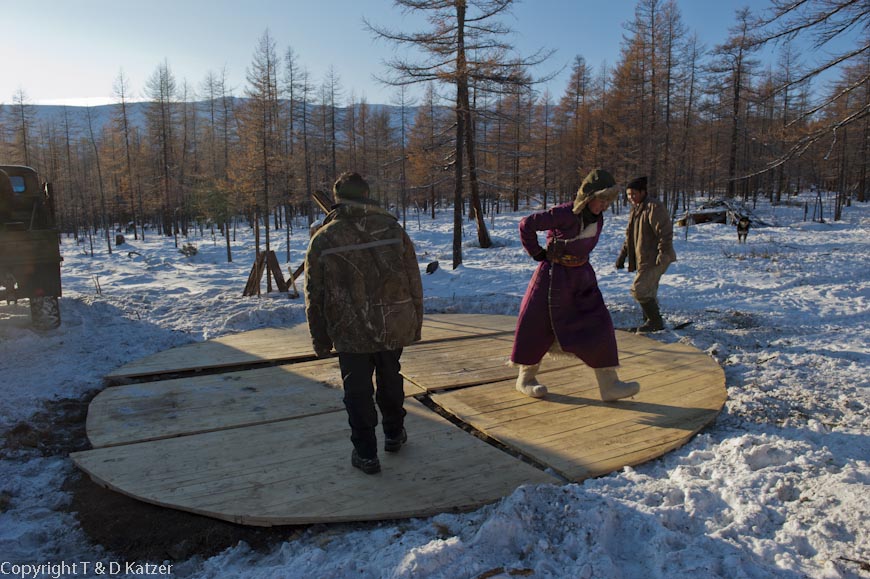

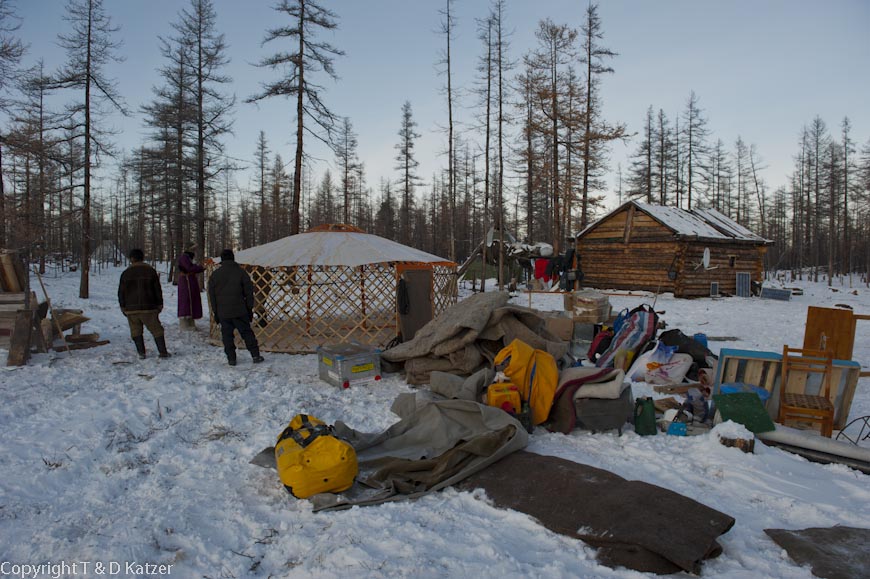

As yesterday showed us once again that there’s no point in rushing, we’re taking things slower today. Above all, we still don’t know whether our new driver has already drunk our money.
With the first rays of sunshine, which are plentiful in today’s blue sky, I slip out of the yurt to see if our neighbor is stirring. “I think I see smoke rising from under his truck,” I shout so that Tanja can hear me in the yurt. “That sounds promising,” she replies happily. “Yes indeed, now a boy comes out of the log cabin with a big bucket of steaming water. No doubt they’re getting their truck ready to go,” I say, walking back into our Mongolian tent.
As usual, Shagai arrives at 10:30 and once again with his friend. After the Russian truck returns from refueling – the fuel pump has obviously been repaired – they shovel earth onto the bed of the truck in front of Ayush’s log cabin. “We need them to level out the uneven forest floor in the taiga,” explains Shagai. “That the wooden floor of the yurt has a straight supporting surface?” I ask. “Yes.” “And you can’t find any soil out there?” “It’s all frozen,” he explains.
Then the driver comes with a friend and helps us dismantle the yurt. Suddenly everything happens at lightning speed. While Tanja is still repacking the remaining items from her kitchen, the felt mats of the yurt roof are being removed. “Get out of there before the wooden frame falls on your head,” I warn her. Within an hour, we had stowed the entire yurt and its extensive contents on the loading area. The men work carefully and professionally. At the end, they heave Mogi’s heavy doghouse onto the felt mats. Then I lift Mogi up. Shagai, who is now prancing around on the equipment, takes it from me. Mogi, whose eye has almost completely recovered after the treatment, wags his tail and also seems to be looking forward to the trip. “Can you take this with you?” asks a Tuwa woman, handing us four parcels. “Of course,” we say and stow them safely between our equipment.
Tanja and I quickly run to Ayush and Tseden-ish to thank them for their hospitality over the last 7 ½ weeks. thank you. “It’s all right,” we hear him humming more than talking. Then we huddle together on the only passenger seat of the truck while Shagai, his friend and the driver’s friend find a draughty and freezing cold place on the loading area. We leave Tsagaan Nuur behind us in fantastic weather and a warm minus 25 °C. Once again we take the route we took on our first visit to Tuwa. The large, coarse tires of the truck work their way through the snow, over the ice of the lake, ditches, frozen rivers, valleys, roots and rough rock. The magical winter landscape welcomes us with open arms. “Now we’ve made it after all,” I say with a satisfied look at the sugar-covered mountains. “I never doubt it,” Tanja replies. “I had no doubts either. It was just a question of when and how. I’m happy to be able to spend the New Year with the Tuwa,” I say. “Yes, that’s a wonderful thought,” Tanja also replies happily.
Just 1 ½ hours later, in the middle of the taiga, we reach the camp of the reindeer people who call themselves Tuwa. In bright sunshine, those who are in the camp come together and greet us with laughter and open-heartedness. Without further ado, everyone helps to unload the truck. As soon as the loading area is empty, the driver, his friend and Shagai’s friend set off to fetch our firewood. Shagai and Tsaya’s friend and a few others whose names I don’t know yet help us set up the yurt. In the meantime, the sun is already setting again, causing temperatures to drop rapidly to minus 30 °C.
It is already pitch dark when the yurt is finally set up and all the boxes are stowed inside. Tanja and I try to find our way through the chaos. We are dog-tired and only function mechanically at this hour. Shagai comes in, puts a few pieces of wood into the stove and before we can stop him, he has already poured gasoline from the canister for the chainsaw over the wood. It immediately smells unpleasant. He lights the wet wood on fire and leaves the newly built dwelling to eat something at Tsaya’s. It only takes a few minutes before the fire is out again. Then I get bark and some kindling to light it again. The flames, which were only virginal at first, quickly spread. It doesn’t take long for it to warm up. While Tanja tries to find the right kitchen boxes and unpack them, I screw the Wandan together. The Tuwa still seem to be shy towards us. None of them show their faces any more. They have all retreated to their tepees.
At 9 p.m. there is a mountain of bad wood next to our dwelling. “There is no better in the taiga,” explains Tsaya. Later we learn that each of the Taiga inhabitants goes into the forest and fetches their own wood as required. So the fuss about wood would not have been necessary, which would have saved us money. But what the heck, we’re taken care of for now and have more time to settle in here.
Shagai and the crew then say goodbye to us. “I thought you were staying overnight?” I wonder. “Too much work to get the truck going again in the morning,” Shagai explains. “I see,” I say, handing him his wages and also giving his friend a day’s pay, who despite announcing his intention not to receive any money has helped. “Tschin setgeleesee bajrlalaa”, (“Thank you very much”) he says and presses the bills to his forehead, laughing happily. Then the truck’s engine roars to life. The large wheels crunch in the icy snow. Just a few seconds later, the large vehicle disappears behind the needleless larches and the sound of the engine is swallowed up by the taiga. Silence that we haven’t heard for a long time falls over the small clearing. It is so quiet that it seems to rustle in your ears. In the light of our headlamps and the only candle, we place the food cartons under the wall. Then we put the folding table in the corner of the kitchen, an aluminum box with running food next to it. I drag my energy box under the wooden table on the opposite side. Piece by piece, our home is slowly taking shape. We clear and mediate until midnight. Then, exhausted, we settle down on our loft bed. A few stars twinkle through the smoke outlet in the roof crown. Ice crystals shimmer through the night sky. “Will they accept us here?” I ask quietly. “Definitely. We’ll have an unforgettable time with these people,” Tanja replies, barely audible, her voice mingling with the crackling of the fire in our stove.
We look forward to your comments!

